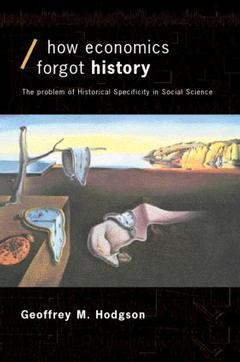How Economics Forgot History The Problem of Historical Specificity in Social Science Economics as Social Theory Series
Auteur : Hodgson Geoffrey M

In arguably his most important book to date, Hodgson calls into question the tendency of economic method to try and explain all economic phenomena by using the same catch-all theories and dealing in universal truths. He argues that you need different theories to analyze different economic phenomena and systems and that historical context must be taken into account.
Hodgson argues that the German Historical School was key in laying the foundations for the work of the pioneer institutional economists, who themselves are gaining currency today; and that the growing interest in this school of thought is contributing to a more complete understanding of socio-economic theory.
Geoffrey M. Hodgson is a Research Professor in Business Studies at the University of Hertfordshire. He has published widely in the academic journals and his previous books include Economics and Utopia (Routledge, 1999)
Date de parution : 08-2001
Ouvrage de 422 p.
15.6x23.4 cm
Thème de How Economics Forgot History :
Mots-clés :
German Historical School; Historical School; german; Gustav Von Schmoller; historical; Keynes; school; Socioeconomic System; gustav; Socio-economic Systems; von; Economic Journal; schmoller; Socio-economic Evolution; werner; OLDER HISTORICAL SCHOOL; sombart; Timeless; thorstein; S T O R Y; veblen; R Y; British Historical School; General Equilibrium Theory; Provisioning Institution; Alan Kirman; Organicist Ontology; Marginal Revolution; Alfred Whitehead; General Theory; Violated; Gustav Von; Ideal Type; JOHN COMMONS; Follow
